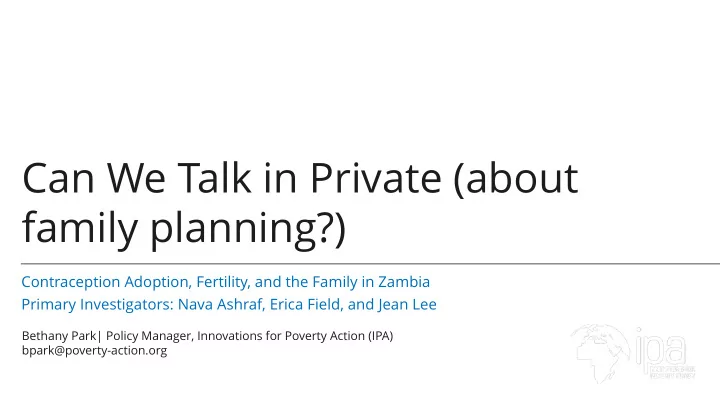

Can We Talk in Private (about family planning?) Contraception Adoption, Fertility, and the Family in Zambia Primary Investigators: Nava Ashraf, Erica Field, and Jean Lee Bethany Park| Policy Manager, Innovations for Poverty Action (IPA) bpark@poverty-action.org
Summary Giving women private access to contraception: • Increased contraception take-up and use • Delayed pregnancy among some women But some women who received private access were less likely to report being happy and healthy.
Substantial Unmet Need for Contraception Policy Issue • In 2013, Zambian women had 0.8 more children than their desired number of 4.5 children. • In contrast, Zambian men reported an ideal family size of 5.0 children.
Research Questions Can giving women private access to contraception affect their contraception use? Does involving men increase or decrease contraception use?
Voucher Intended to Increase Contraception Access Intervention description Researchers provided women with a voucher guaranteeing immediate access to modern contraceptives, including injectables and implants. The voucher was provided through a private appointment with a family planning nurse.
Research Design Study sample: 749 married women , ages 18-49, had given birth in • the past two years At baseline household visit: ALL women given information about • family planning and STIs (March-June 2007) Second household visit: Women randomly assigned to two • groups: 1. Couple group: Voucher given to men with women present 2. Individual group: Women given the voucher privately • Take-up data collected at clinic (daily logs) • Two years later, follow up survey in households
Private Access Increased Contraception Use Results Private access increased voucher redemption rates. 70% 63.2% % of women who redeemed voucher 60% 52.9% ** 47.3% 50% 42.8% 40% 30% 20% 10% 0% All women Women whose husbands want more children Individual group Couple group Statistically significant difference relative to the comparison group is noted at the 1% (***) or 5% (**) level.
Private Access Increased Contraception Use Results Private access increased injectable contraceptive use. 30% 28.40% % of women who received injectables 24.30% 25% ** 20% 18.30% 14.80% 15% 10% 5% 0% All women Women whose husbands want more children Individual group Couple group Statistically significant difference relative to the comparison group is noted at the 5% (**) or 10% (*) level.
Private Access Delayed Pregnancy Results Women with private access • delayed their next pregnancy by an average of 3 to 5 months longer than those in the comparison group. Even when husbands did not • want children right away, their involvement reduced women’s take-up of contraceptives.
Private Access Came at some Psychological Cost Results Differences in take-up were largely driven by women’s desires to • hide choices from their husbands. Women in the individual group reported being significantly less • happy and healthy than those in the couple group. There was no difference in incidence of domestic violence or divorce between the two • groups.
The Way Forward Research & Policy Next Steps Given the results of the study, the Ministry of Health and • researchers sought to answer the remaining policy issue: How to reduce fertility rates while maintaining household unity? Initial survey: superstitions about causes of maternal mortality are • widespread and such beliefs impede learning about maternal health risk Can providing reliable maternal health information to men bridge • the gender gap in demand for family planning?
Pilot Results Two small-scale pilots in 2010 and 2012 & an immediate post-intervention survey from 2016 suggest that information encourages contraception use. % of Couples Who Redeemed Free Contraception Vouchers Pilot Studies 45.00 40.00 35.00 30.00 25.00 20.00 2012 Pilot 15.00 2010 Pilot 10.00 5.00 0.00 Attended Comparison Community Group Meeting
Potential Impact of Study We hope it can change the conversation about family planning & family unity This low-cost intervention could be scaled using existing community • health systems, in line with MoH goal of increasing household family planning demand. Safe Motherhood Action Groups (SMAGs) & Community Based Distributors • (CBDs), volunteer groups delivering essential info on safe motherhood and family planning, respectively, to their communities Community Health Assistants (CHAs), a low-cost government cadre delivering • community health services CHAs and CBDs already providing family planning info to couples à this • program could be a low-cost tweak , with training through existing CHA curriculums and training structures.
Thank you This project was made possible through support from, among others, the John Templeton Foundation, the William and Flora Hewlett Foundation’s Grant 2012-7944, the Global Development Network (GDN)/International Initiative for Impact Evaluation (3ie), and the International Growth Centre. The opinions expressed in this presentation are those of the authors and do not necessarily reflect the views of the John Templeton Foundation or any other supporter. poverty-action.org
Recommend
More recommend